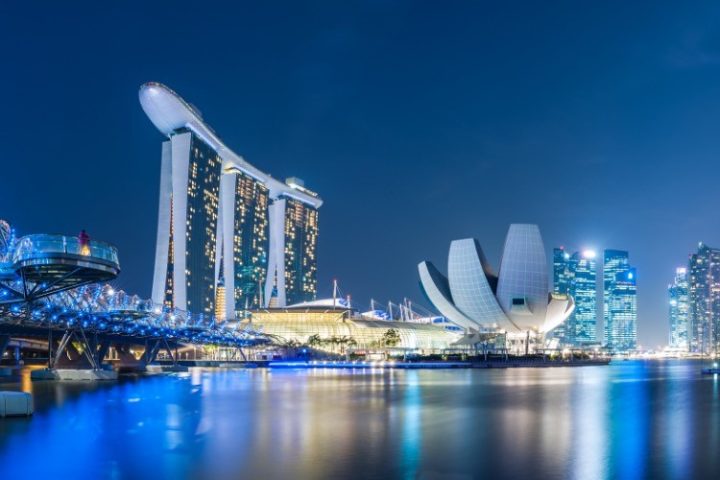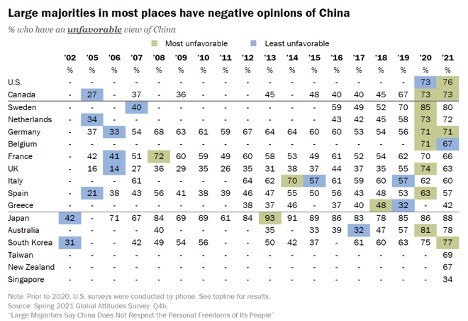
SINGAPORE — Singapore is the No. 2 country in the world prone to China’s influence, based on a report known as the China Index, launched by Taiwan-based research institute Doublethink Lab (DTL) on April 25.
From a sample of 36 countries and regions, Singapore ranked just one spot behind Cambodia, and was rated two points higher than Thailand. In the top 10 countries were Taiwan and Australia, ranking ninth and 10th, respectively. The United States ranked 15th, right behind Germany.
DTL, which also surveys pro-China disinformation campaigns in Taiwan, asserted that this report was “the first ever attempt to survey and portray the PRC’s influence in the world” in nine domain areas.
Singapore was listed especially high in Chinese influence in the fields of academia, technology, and economy. Out of all areas, Singapore ranked top on the list in the field of technology, with the DTL report stipulating that China-based venture capital is rising in various areas in Singapore. Moreover, the report claimed that Chinese firms have been supplying technology that Singapore is utilizing.
Economy-wise, although China is not the biggest foreign investment source for Singapore, Singapore is the biggest foreign investor in China. For example, China is the biggest investment destination for Singapore state investor Temasek Holdings. The report also stated there has been “no direct economic coercion yet,” despite classifying the detention of nine Singapore Armed Forces Terrex infantry carriers in Hong Kong in 2017 as a form of “coercion.”
In the field of academia, the report mentioned examples where Singapore’s Nanyang Technological University (NTU) allegedly told its faculty and guest speakers to refer to Taiwan only in ways acceptable to the Chinese government. A contributing expert asserted that a U.S.-based historian researching the history of WWII was supposedly instructed to ditch allusions to the “Republic of China” in the presentation he was set to give at the university.
In the areas of media and society, the DTL report claimed that Singapore was also susceptible to China’s influence. China’s influence in the area of society was defined as the success of China’s efforts to promote its soft power in Singapore over Singaporean organizations and citizens. According to the report, although Singapore residents hold varying views of China, the overall impression of China is a country that holds “great commercial opportunity and technological prowess,” despite some concerns about the intentions of the Chinese government. Additionally, the same report also said that Singapore’s “mainstream media is quite positive of the PRC.”
Another notable point the report broached was how there is a rising number of influential Singaporeans, “often ethnic Chinese males,” who have been advocating “PRC denialism towards Xinjiang.” Singapore’s former foreign minister, George Yeo, was named as the “most prominent of these.”
The report further indicated that Yeo is “closely affiliated with Kerry Logistics,” a Hong Kong company. Yeo served as chairman and executive director of the company from 2012 to 2019. He remained as senior advisor to the Kuok Group for another two years, and retired on June 1, 2021. Also included in the report were Yeo’s controversial public remarks that China “is not” committing genocide in Xinjiang. Since he left politics in 2011, Yeo has spoken widely and written prolifically on China.
Recently, Yeo admitted in a media interview that he accepts what people have touted him to be — a “pro-China” scholar. When asked about the significance China has for Yeo, he replied that the Chinese have a saying that when the leaves are old, they fall back to their roots. He elaborated about how the “Chinese-ness” of his own father intensified in his older age, giving an instance of how the older man was cheering the Chinese team on during an Olympic game.
“That’s how he felt. As you grow older, your sense of tradition and your ancestry become stronger.”
When the interviewer noted that some younger Chinese Singaporeans may align more strongly with their Singaporean nationality than Chinese ethnicity, Yeo said, “In Singapore, you can say that.”
“If you’re a Singaporean Chinese in America, you will feel much more strongly in your Chinese-ness because others see you in your Chinese-ness, and you can’t escape it,” Yeo added.
Overall, the report revealed data garnered from March 2021 to August 2021 from several regions worldwide, covering Africa, Central Asia, East Asia, Southeast Asia, Europe, North America, and South America.
The results of the DTL report about Singapore’s vulnerability to Chinese influence appear to corroborate results of previous polls. For example, a poll done by Washington, D.C.-based think tank Pew Research Center in 2021 revealed that Singapore was the only advanced economy, out of the 17 surveyed, where more people have a favorable view of China than the United States.
Another report, produced by French military think tank IRSEM late in 2021, asserted that Singapore is “particularly vulnerable” to Chinese influence. The contributing factors mentioned were Singapore’s “size, hyperconnectivity, common use of both English and Chinese, [and] its dependence on imports.” The “Chinese roots” of a majority of its population, as well as the role of Chinese clan associations in Singapore promoting Chinese identity and kinship, were also listed as significant factors for Singapore’s vulnerability. Nonetheless, the same French report also highlighted that Singapore is “well-equipped” to counter pressure from China and eschew the imposition of a “Chinese identity” onto the country. The reason given by the report was that Singapore has developed “a unique national, multiethnic and multicultural identity” that acts as a “counter-narrative” to the one that pro-China agents might be trying to promote.

Background to Singapore-China relations
The history of Singapore-China relations in the 20th century can be linked back to the impressive economic growth of the Singaporean city-state after its independence in 1965. Singapore’s economy grew at an annual rate of more than six percent for three decades (and more than 10 percent for half that time), except for just three years. As the title of former Singaporean Prime Minister Lee Kuan Yew’s memoir stated, Singapore rose “from third world to first.” Throughout that period, Lee’s political party, the People’s Action Party (PAP), maintained (and still maintains) its grip on power.
In light of Singapore’s spectacular rise to economic prosperity, the Chinese Communist Party that had begun an economic reform process to transform its brand of communism into what would become commonly known as “socialism with Chinese characteristics,” regarded Lee’s Singapore as an example of how to create economic prosperity under a one-party rule. In 1978, Chinese Vice Premier (and eventual leader) Deng Xiaoping met Singapore’s Lee. Lee reciprocated Deng’s visit and visited China 33 times. Both Lee and Deng happened to hail from a common Hakka Chinese heritage and even became good friends. In 1992, Deng went so far as to describe Singapore as the model China should follow for development.
Nevertheless, as China’s economic rise escalated and its military clout expanded over time, Singapore became friendly with other major powers such as Japan, India, and the United States. As a small country keen in defending its national sovereignty, at least militarily, Singapore is the sole Southeast Asian country that has been able to keep up with China’s escalating military power, based on a 2019 report published by the Foreign Policy Research Institute.
Also, Singapore has granted permission to the United States to station on a rotational basis one of its littoral combat ships at Changi Naval Base since 2013 and to fly P-8 anti-submarine warfare aircraft from Paya Lebar Air Base since 2015. Undoubtedly, having a U.S. carrier battle group occasionally in port in Singapore could deter any hostile foreign influence from another dominant power.



